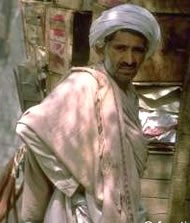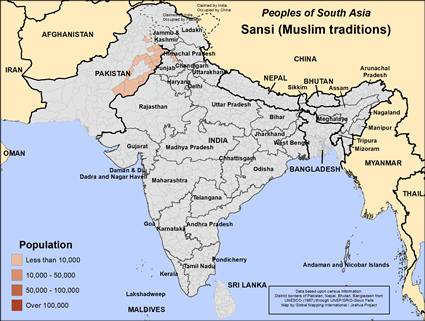The Sansi Bhil inhabit the rural areas of Pakistan's Sindh Province. They are classified as a Bhil ethnic group, and their native language, Sansi, belongs to the Indo-Aryan linguistic family. Most of the Sansi Bhil are bilingual, speaking both Sansi and Western Punjabi.
The known history of the Sansi dates back to their defeat in the Mughal wars, which took place between the 1500s and the 1700s. When they lost their lands in these wars, the Sansi began to roam northern India and became known as a wandering community.
After India's independence from Great Britain in 1947, there was ongoing conflicts between the Hindus and Muslims. Pakistan was established as a separate Muslim state in 1947. At the partition, the Sansi, along with other Muslims of the Eastern Punjab region, migrated to Pakistan. There, they lived below the poverty line and were forced to beg for food.
Working as cattle herders and field hands for wealthy Pakistani landowners, the Sansi scrape out a meager livelihood. Because no land provisions were made for them when Pakistan was created, very few Sansi own their own land. Many are essentially slaves, and the landowners that have kept them for generations are reluctant to set them free. This issue has caused significant dissension within Pakistan.
Some Muslim Sansis are migrant farm workers. They follow the seasonal crops to bring extra income to their suffering families. Wheat and maize are the staple crops, followed by rice, cotton lint, and millet. Skilled and unskilled Sansi laborers also have jobs in factories and mills.
Women have an honorable position in Sansi culture. Adult marriages are the norm, with the bride leaving her family to live with the groom's family until they can set up their own household. For many years the Sansi lived in extended family units. However, the number of nuclear families has been increasing for decades.
Some Muslim Sansi villages are very small, containing only one or two extended families. The Sansi villages that are located near other Sindh villages usually remain isolated. The Sansi have very little in the way of wealth, and their traditional plaster houses are cramped and dirty. Today, some are building houses that have more rooms so joint family living will not be so congested.
Many of the Sansi who immigrated from India to Pakistan in 1947 quickly became Muslims so they could conform to this new Islamic state. They believe in the tenets of Islam, but it's very possible it isn't internalized. Their true faith is in the spirit world.
The Sansi desperately need justice—to be treated as valuable people and lifted out of oppression and depression. Only God can bring inner healing to the Sansi and give them the stability and security they have needed for so long.
Pray for inner healing for Muslim Bhil people as they understand their worth in Christ.
Ask the Lord of the harvest to send faithful laborers to live and work among the Sansi Bhil in Pakistan.
Pray for Sansi Bhil family leaders to have dreams of the righteous and powerful Lord, leading entire clans to Jesus.
Pray for a spiritual hunger that will lead Muslim Bhil religious leaders to seek and find Jesus Christ no matter what the social cost may be.
Scripture Prayers for the Sansi (Muslim traditions) in Pakistan.
| Profile Source: Joshua Project |











